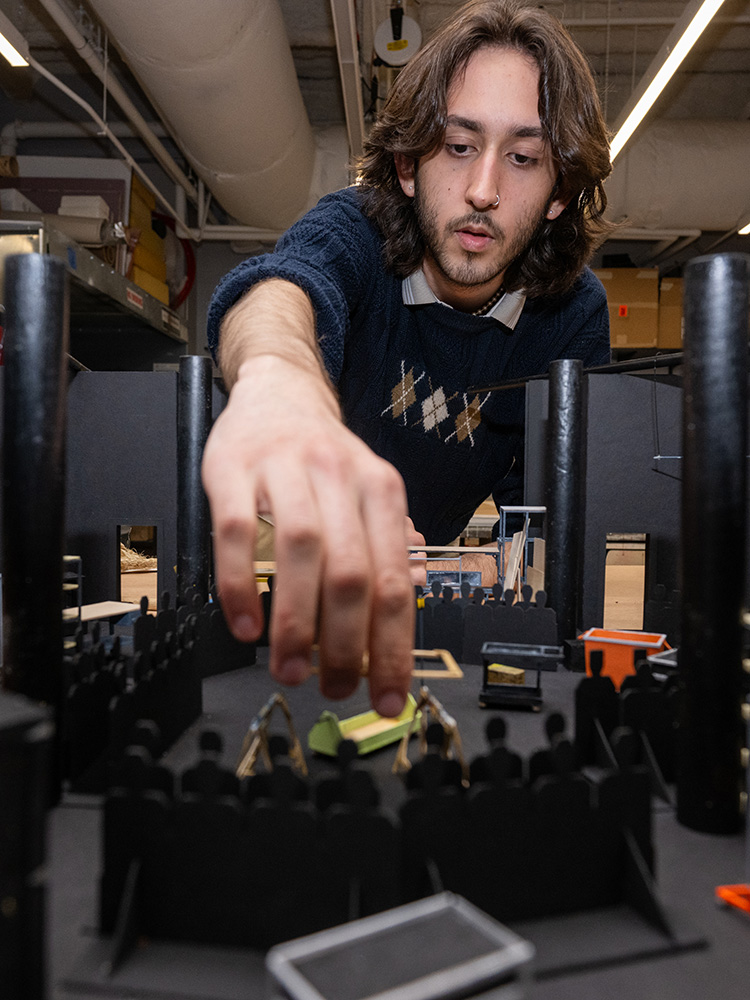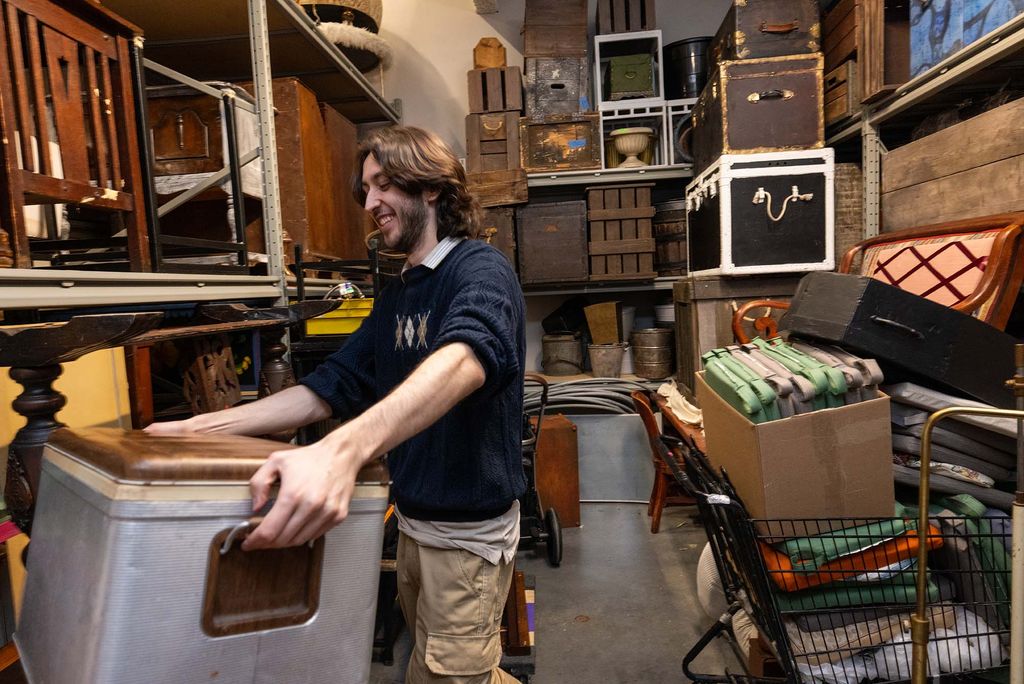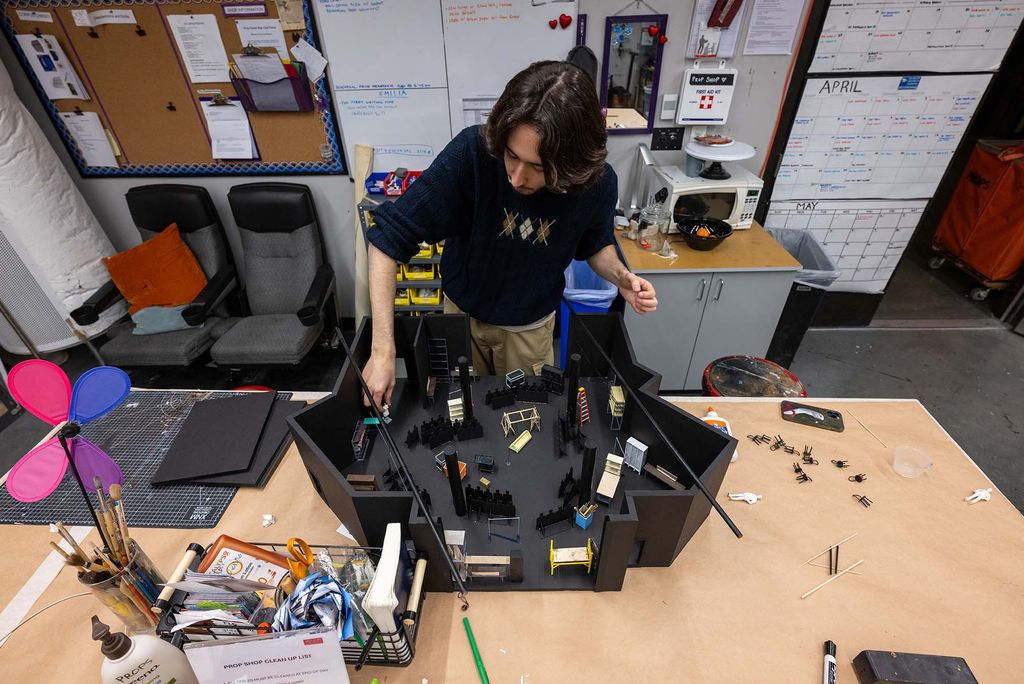How I Made This: Ethan Vettese (CFA’26)
On scenic design, building a world, and bringing it all back home

As scene designer for Corpus Christi, running April 10 through 13 in CFA’s Studio ONE, Ethan Vettese (CFA’26) oversees the construction and design of the play’s set and the movement of its props.
Ethan Vettese (CFA’26)
On scenic design, building a world, and bringing it all back home
How I Made This is a series from BU Today that explores how Boston University students create their works of art—be it a musical composition, a fiber sculpture, a short story, a painting, and beyond. Are you part of BU’s creative community? Tell us about your work here.
It‘s a comedy—it’s funny and heartwarming—but it’s also a tragedy. “It has themes of discrimination, hate, finding your people, and above all else, love. Love of each other, love of everyone.”
So says Ethan Vettese about Corpus Christi, a play by Terrence McNally that reimagines the life and death of Jesus Christ as a gay highschooler in Corpus Christi, Tex. Vettese (CFA’26), a Boston University junior in the College of Fine Arts School of Theatre, is the play’s scenic designer, and he has been tasked with creating a world that combines the timelessness of the Passion Play with the timeliness of the show’s themes of homophobia and resilience in the face of intolerance. The show runs through April 13 at CFA’s Studio ONE.
“We see all the normalities of going through high school, senior prom, and gym class, but we also see him gathering his apostles. He’s finding his people,” Vettese explains.
The play premiered in 1998 at the Manhattan Theatre Club to protests and threats of violence. In the decades since, productions around the world have been met with similar reactions.
“I think that makes it even more important today,” Vettese says. “If Jesus can’t be gay, then is he really an image of everybody?”

Vettese reviewing a layout of Studio ONE, a space within the College of Fine Arts. As a black box theater, it has special considerations—like a 360-degree view of the stage—that need to be accounted for in his designs.

Although Corpus Christi takes place in Texas, to bring the story closer to home, this production uses props and materials that reference BU’s School of Theatre. The decision forced Vettese to think creatively about how to reuse familiar items from School of Theatre productions.

Vettese maps out the play’s scene changes using a scale model of the set.

“As the scenic designer, I deal with the space: what the world feels like, and how the story is told through that world,” says Vettese. “It’s big, and then it gets smaller and smaller as you’re dealing with props.”
“How I Made This”
BU Today: First off, what is the purview of the scenic designer?
Ethan Vettese: We have designers for each field, so as the scenic designer, I deal with the space: what the world feels like, and how the story is told through that world. It’s big, and then it gets smaller and smaller as you’re dealing with props. There are days where you’ll be able to go into the shop and see the show being built and painted, and later you’ll see everything put into the space and the world coming together.
BU Today: Take us through a typical production, step by step.
Ethan Vettese: I analyze the script by reading it many times, and then I do research. I look at the big three: when it was written, when it takes place, and when it’s being performed. Then [the crew] meets as a team, and we’ll also meet with the director to talk very basically about the story and where we want to go with it. I start doing all of the hand work—whether that’s sketches or rough ground plans. Once we’re set on the idea, then comes the paperwork: drafting packages, research, photos, prop lists, and all of that. The space comes first, and then once the space has been figured out, props come in, and we’re like, okay, what fits into this world?
BU Today: So what fits into the world of Corpus Christi? What direction are you taking with it?
Ethan Vettese: What we’re doing with Corpus Christi is a little bit different, where we’re not designing a space that depicts what’s written in the script. The script takes place between the 1950s and 1980s, but we’re recreating the BU School of Theatre. We’re creating an amalgamation of a costume shop, a prop shop, a lighting shop, an actor studio, and we’re putting all of them together into one room. Aesthetically, it’s spontaneous. It’s the chaotic mess of the theater world, and it’s all of our lives swirling together into one room.
BU Today: How have you been putting everything together?
Ethan Vettese: The space morphs throughout the play because the script moves so quickly. The actors tell the story through props: what if the ladder becomes a Christmas tree, or what if a rug gets pulled down and becomes a backdrop? That’s how we surprise the audience within a story we all know. A big question at the beginning was, how do we get from one scene to another super quickly, over and over and over again? I have spent countless days walking around the Booth and CFA thinking, this might be a costume rack, but what else can it be? How can we light this to create a shadow of something else on the wall?
BU Today: Sounds tricky. Why not just set the show in a Texas high school?
Ethan Vettese: There’s a lot happening in America today, even before the election and all of the political changes. We decided as a team that it was important that we bring it back to BU and to us—what we do, our art, and our community. We hope the story will keep living even after our production closes, so that [another School of Theatre student] may walk by a shelf in the prop shop and say, ‘That was in Corpus Christi.’ It allows you to piece it together and remember the story. It lives on in our community that way.
Corpus Christi, directed by Gregg Wiggans (CFA’25), runs Thursday, April 10, through Sunday, April 13, at Studio ONE at the College of Fine Arts, 855 Commonwealth Ave. General admission tickets are $20; purchase here.
This Series
Also in
How I Made This
-
March 5, 2025
How I Made This: Maithili Rajput (CFA’25)
-
May 23, 2025
How I Made This: Jacob Whitchurch (CFA’26)



Comments & Discussion
Boston University moderates comments to facilitate an informed, substantive, civil conversation. Abusive, profane, self-promotional, misleading, incoherent or off-topic comments will be rejected. Moderators are staffed during regular business hours (EST) and can only accept comments written in English. Statistics or facts must include a citation or a link to the citation.